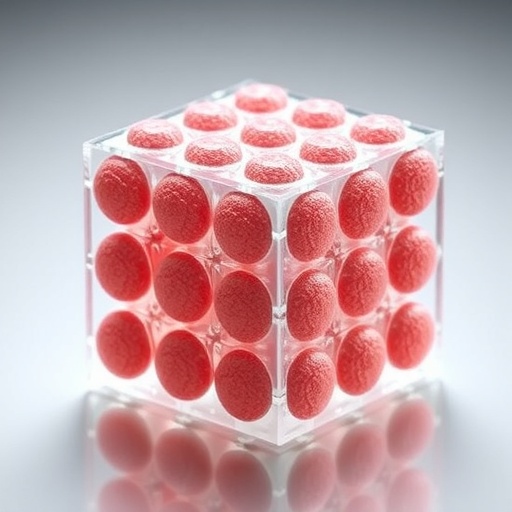Researchers have made significant strides in the development of solid electrolytes for lithium-ion batteries, a critical component that can potentially revolutionize energy storage technology. A groundbreaking study by Angales, Kumar, and Kannan focuses on synthesizing a new class of solid electrolytes, specifically Li4Si(1–0.75x)MxO4, using yttrium as the dopant metal. This innovative approach could enhance the performance of lithium-ion batteries, making them safer, more efficient, and capable of supporting next-generation applications in electric vehicles and portable electronics.
The focus of this research lies in the precise synthesis of Li4Si(1–0.75x)MxO4. The choice to use yttrium as a dopant is particularly noteworthy, as yttrium’s ionic properties may enhance the ionic conductivity of the solid electrolyte. The researchers employed various synthesis techniques to achieve the desired structural and chemical properties of the material, optimizing conditions to ensure uniformity and stability. This meticulous process ultimately contributes to the electrolyte’s performance, which is essential for maximizing battery efficiency.
.adsslot_l6iGE4KTLY{ width:728px !important; height:90px !important; }
@media (max-width:1199px) { .adsslot_l6iGE4KTLY{ width:468px !important; height:60px !important; } }
@media (max-width:767px) { .adsslot_l6iGE4KTLY{ width:320px !important; height:50px !important; } }
ADVERTISEMENT
One of the pivotal aspects of this study is the investigation into the structural characteristics of the synthesized compound. By employing advanced characterization techniques such as X-ray diffraction and scanning electron microscopy, the researchers were able to elucidate the material’s crystallographic structure and morphology. Understanding these properties is crucial, as they directly influence the ionic conduction pathways within the solid electrolyte. The findings from these characterizations suggest that the addition of yttrium effectively modifies the framework of the lithium silicate, potentially leading to higher ionic conductivity.
The performance evaluations of the synthesized solid electrolyte were rigorous and multifaceted. Researchers tested the ionic conductivity across various temperatures to establish a comprehensive understanding of the material’s behavior under different operating conditions. Their results indicate that the yttrium-doped Li4SiO4 demonstrates superior ionic transport properties compared to its undoped counterparts. This enhanced conductivity is a promising indicator that the material could perform well in practical battery applications.
In addition to conductivity, the researchers also explored the electrochemical stability of the solid electrolyte. This is a crucial parameter, as any instability can compromise the battery’s safety and performance. Through a series of electrochemical tests, including galvanostatic cycling, they were able to demonstrate that the yttrium-doped electrolyte maintains excellent stability over extended cycling periods. These findings underscore the potential of utilizing such materials in future commercial applications.
The implications of this research extend beyond simply improving existing technologies. The work sets the stage for the development of next-generation lithium-ion batteries that are not only higher performing but also more environmentally friendly. The shift towards solid-state batteries can significantly reduce the reliance on harmful organic solvents typically used in liquid electrolytes. This transition aligns with the broader goal of developing sustainable energy solutions that address both technological and environmental concerns.
Moreover, the synthesis of solid electrolytes, such as those based on Li4SiO4, facilitates the integration of lithium metal anodes, which are known for their high energy density. This integration poses a powerful opportunity for enhancing the overall energy capacity of lithium-ion batteries. The potential increase in energy density could be a game-changer for electric vehicles, enabling longer ranges on a single charge and accelerating the adoption of electric mobility.
As the research community continues to explore solid electrolyte systems, the findings from Angales, Kumar, and Kannan’s study provide a cornerstone for future investigations. Their work serves as a basis for further modifications and optimizations, potentially leading to even more advanced solid-state electrolyte materials. This not only paves the way for improvements in battery technology but also ignites a collaborative effort across multiple disciplines to address the challenges facing energy storage systems today.
The ambitious research objectives underscore the transformative potential of solid electrolytes in future battery technologies. By focusing on innovative and practical solutions, researchers are sculpting the landscape of energy storage. Their findings not only add valuable knowledge to the field but also inspire confidence in the possibility of achieving a more sustainable energy future.
As the world pivots towards a more electrified landscape, the implications of these developments extend to various sectors beyond personal electronics and electric vehicles. The advancement of solid-state batteries may facilitate breakthroughs in renewable energy deployment, enhancing energy efficiency in solar and wind applications, and supporting grid stability. In this context, the ability to store and deploy energy efficiently becomes paramount.
The significance of the research conducted by Angales and colleagues cannot be overstated. Their innovative approach to solid electrolytes represents a pivotal moment in energy storage technology. The ongoing quest for safer, more efficient, and environmentally friendly energy storage solutions aligns perfectly with the current global needs. As the study unfolds in the scientific community, it is anticipated to trigger further exploration into advanced materials that hold the promise of changing how energy is stored and consumed.
In summary, the synthesis of yttrium-doped Li4Si(1–0.75x)MxO4 solid electrolytes offers exciting new prospects for the development of lithium-ion batteries. The positive results from this research highlight the potential of solid-state systems to reshape the battery landscape, driving forward innovations that are more efficient and sustainable. The pursuit of improved energy storage solutions has never been more critical, and studies like this serve as beacons guiding the way forward.
Subject of Research: Development of yttrium-doped solid electrolytes for lithium-ion batteries
Article Title: Synthesis of Li4Si(1–0.75x)MxO4 (M = Yttrium) solid electrolytes for Li-ion batteries
Article References: Angales, S., Kumar, G. & Kannan, S. Synthesis of Li4Si(1–0.75x)MxO4 (M = Yttrium) solid electrolytes for Li-ion batteries. Ionics (2025). https://doi.org/10.1007/s11581-025-06550-4
Image Credits: AI Generated
DOI: https://doi.org/10.1007/s11581-025-06550-4
Keywords: lithium-ion batteries, solid electrolytes, yttrium, ionic conductivity, energy storage, sustainable technology
Tags: advanced energy storage solutionselectric vehicle battery advancementsionic conductivity enhancementLi4Si(1–0.75x)MxO4 synthesislithium-ion battery technologynext-generation battery applicationsportable electronics battery safetyrenewable energy storage innovationssolid-state electrolytes for batteriessynthesis techniques for solid electrolytesthermal stability in batteriesyttrium-doped solid electrolytes





